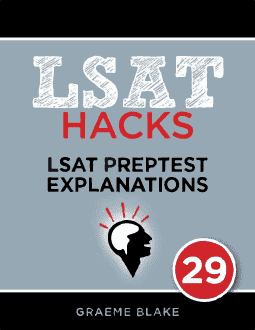QUESTION TEXT: Studies of the reliability of eyewitness identifications…
QUESTION TYPE: Principle – Sufficient Assumption
CONCLUSION: Police officers shouldn’t allow suspect lineups where witnesses can hear each other identifying suspects.
REASONING: There is little correlation between the accuracy of a witness and how confident they are. (i.e. the most worthless witnesses are likely to be confident). Some factors can increase or decrease a witness’s confidence without changing the accuracy of the identification.
ANALYSIS: The stimulus proves that some witnesses are overconfident. But it’s not clear how mingling witnesses will lead to worse evidence.
We need a principle that links the evidence to the conclusion. If overconfident witnesses can influence other witnesses, then mixing them is a bad idea. Jurors might incorrectly switch their opinions.
___________
- CORRECT. A witness might know which suspect is the criminal…but when they go to identify him, they hear some blowhard confidently identifying the wrong guy. This might cause the first witness to become unconfident in their memory and pick the wrong suspect.
- The advice is to keep the witnesses separate. It doesn’t say if the suspects should be presented together or separately.
- This depends. A loud, confident witness could mislead the whole group if witnesses are able to hear each other. The stimulus is assuming this answer choice is true only if the witnesses can’t hear each other.
- Actually the stimulus seems more interested in accuracy rather than the confidence.
- Depends. It’s quite possible for one witness to be right and all other witnesses to be wrong. The main thing is not to let the witnesses influence each other.


Besides, it was generally hard for me to understand the argument (means why it is bad that confidence is altered, assuming that as long as the testimony is accurate we’re fine).
I thought of the scenario that a witness’ testimony might be accurate, but if she hears another witness saying something different, she might become so unconfident that the policemen will not believe her.
But the other way round (how you explained it) makes sense as well: a witness has in mind to make a very inaccurate testimony and is therefore very unconfident. But if she hears another witness saying the same as her, she might become so overconfident that the policemen believe her.
A common question in trials is “how sure are you?”. If the answer is “not very” then a prosecutor might not bring a witness to the stand on trial.
So if a witness is accurate, but something lowers their confidence, then that is bad.
Note: This is an old comment but I wanted to clarify the point.
Let me propose another explanation regarding why (D) is wrong:
– Actually, even if the police officers are more interested in accuracy than confidence, it still doesn’t tell us whether hearing another witness’ testimony affects one’s confidence. That’s exactly what the principle must tell us in order to create a bridge between the premise and the conclusion.